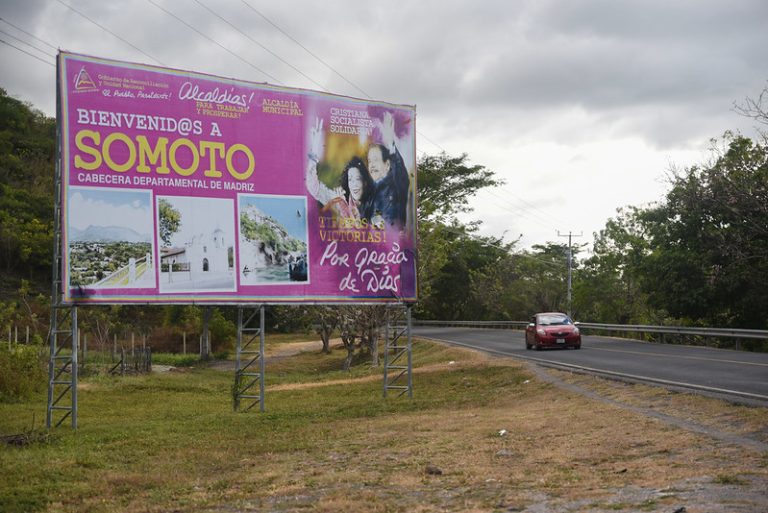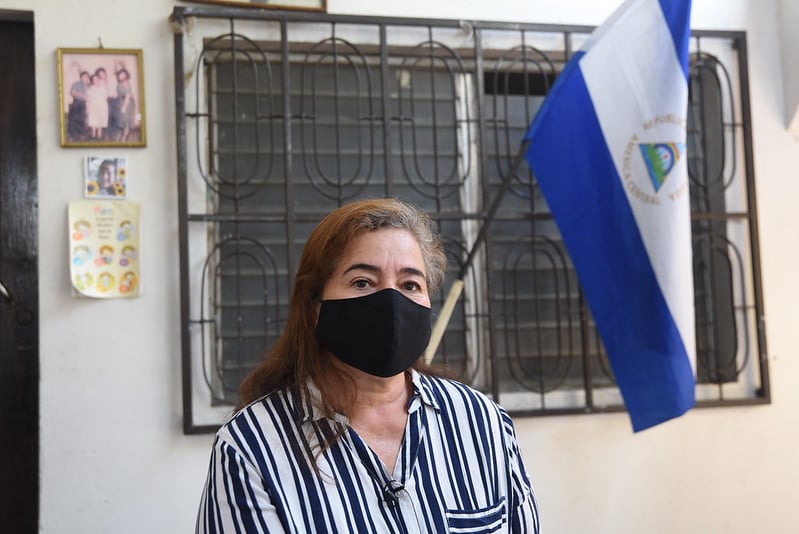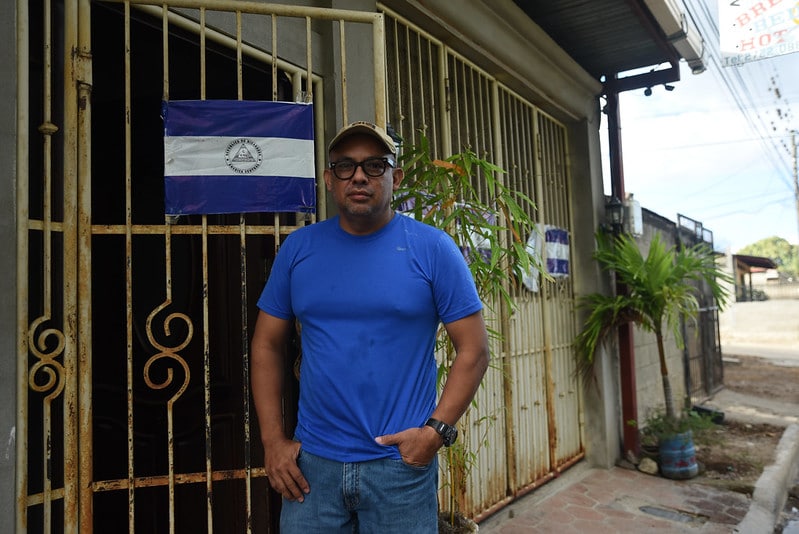4 de febrero 2021

Children of Exile: The Births “Sowing Hope” in the Camp of Nicaraguan Farmers

PUBLICIDAD 1M
PUBLICIDAD 4D
PUBLICIDAD 5D
Four “Somotenos” under de facto house arrest; others under surveillance and harassed. The siege has increase since the arrival of a new police chief.

Entrada de la ciudad de Somoto, Madriz, en el norte de Nicaragua. Foto: Confidencial.
Danelia Arguello has not left her home in a Somoto neighborhood, Madriz, because a police contingent unjustifiably prevents her from doing so. Gynecologist Jose Armando Herrera lives a similar situation, but with the aggravating factor that in front of his house the Ortega paramilitaries set up a booth.
The modus operandi of the Police is the same in both cases to harass them for opposing the Ortega government. Three or four officers arrive in front of their houses, place some orange cones, and block the exit and entrance. This model began to be implemented after the arrival of Chief Luis Manuel Moncada Castillo, at the Somoto police station.
“The police chiefs in the past didn’t carry out such a fierce, extensive repression, as this mister (Moncada) is doing,” compares Dr. Herrera.
“I don’t know him (Moncada), nor do I want to know him. Nor am I interested in what he does because he will never find fear among opponents. The people here have already made a decision and we are going to remain firm until the tyranny falls,” he adds. Moncada was previously a Liberal party deputy.
In September, Moncada Castillo replaced Javier Martinez, who was transferred to the Nueva Segovia police station.
From November to December 2020, at least four citizens are in de facto house arrest, and others under surveillance and harassed by the Ortega Police and paramilitaries. According to Blue and White Movement monitoring, throughout the country some 80 people are subjected to the illegal de facto house arrest regime. The group independently documents the actions of the police state in Nicaragua,
“Before they came sporadically two days a week, but since December 19 (2020) they have not moved from the door (of my house). Every time I have tried to go out, they tell me to go back inside, that I cannot go out, that is the order,” says Arguello.
“At the end of November and the beginning of December the situation was already increasing, in such a way that, for the days of Christmas, it began with shifts (of policemen every 8 hours). Technically the siege was more constant, with a more active permanency,” describes Herrera.
Arguello and Herrera are the opponents most besieged and harassed by the National Police in Somoto. Both belong to opposition platforms Blue and White National Unity (UNAB) and National Coalition (CN), respectively.
According to the Blue and White monitoring, 52 of the opponents harassed in their homes identify themselves as members of UNAB. Meanwhile, the Civic Alliance reports between 12 and 15 daily police sieges against its members. In all cases, the officers do not present a warrant, and limit themselves to indicate that they have orders.
Somoto’s new police chief is in the habit of leading repression and harassment actions against opponents in the city.
Locals commented that it is common to see Moncada leading caravans of the police patrols. These pass in front of the houses of the opponents with their sirens at full volume.
“When I start to complaint (to the police officers) about what is happening, chief Moncada comes with up to eight riot police,” specified the opponent Johana Moncada, who is constantly besieged in her home.
She explains that 15 days ago, the chief told her she could not leave her home. He said if I tried to hold a meeting with other opponents, she would be arrested. She is married to Bassil Bayres, leader of the Peasant Movement in the department of Madriz.
The couple cannot leave their home. This affects a roast chicken business they have out of their house. “When they place themselves from eight in the morning to twelve noon, absolutely nothing is sold during that time. (Before the besiegement) we sold about ten chickens before noon, that’s about two thousand cordobas (about 58 dollars at current exchange rates) in loses.”

Johana Moncada has losses in her roast chicken business, due to the police harassment of her home in Somoto. Photo: Nayira Valenzuela / Confidencial
The gynecologist Herrera has his office in his home. Therefore, the police harassment restricts the arrival of patients. “People are afraid when they see the Police in front of my house,” he highlights.
Jose Gonzalo Hernandez is the president of the National Chamber of Tourism (CANATUR) in Madriz. Another embattled opponent, he feels the effect on his tour operator business in the Somoto Canyon.

Jose Gonzalo Hernandez Caceres is besieged daily by police officers at his home in Somoto. Photo: Nayira Valenzuela / Confidencial
“Tourists come and they ask for their IDs and for them to sign up on a list. Sometimes visitors express their discomfort because they don’t like being stopped,” he emphasizes. Hernandez is also a former political prisoner of the regime.
“I apologize to the tourists and tell them that our (tour operator) business is not a problem. We explain that the Police cause the problem and it’s not in our hands,” he adds.
Jose Hernandez lived moments of anguish when the police prevented him from taking one of his youngest children, who was ill with dengue, to the doctor.
“I had to take (my child) for a test and to the doctor, but (the police) told me that I could not leave. I told them: ‘If you are going to arrest me, it is your decision, but I don’t care what you do with me, my child has a fever and I have to take him to the doctor.’” They forced me to go inside, and after a while an officer appeared and she told me that I could go out,” narrates the former political prisoner.
Two days after that incident, the police again besieged the home of the former political prisoner. Again they prevented him from taking his child to the doctor. Daily and for a week, the citizen had to take his little child to have blood tests to know the status of his platelets.
“One of them appeared and told me he was a captain. He told me: “You already know that you cannot go out.” On that day, tears flowed, I felt helpless as a father. He made me show him the prescriptions, the tests. I called the doctor on the phone and put him on speaker for him to explain how they handle the dengue protocol,” says Hernandez.
Daniela Arguello has had to deal with police harassment and Covid-19 infection of her minor son. She could not take him to the doctor. The father took the child out of the house early, before the agents arrived, to go to the doctor.
“People may think ‘how disrespectful that woman is with the authorities.’ But I think it is more disrespect for us when they deny you access to health care to a child. Likewise, not having the right to go to the pharmacy to buy a medicine. To have to wait for them (the police) to leave to be able to send someone to the pharmacy,” she commented.
Police harassment is not only against opponents. In Somoto, the Police and regime supporters monitor and photograph vehicles with plates different from Madriz.
The police detained the Confidencial journalistic team for more than 40 minutes at a checkpoint outside Somoto. In addition to the documents of the vehicle and the driver, the officers demanded the identity cards of the four members of the team (driver, cameraman, photographer and journalist). They also ordered them to detail the purpose of the trip and with whom they spoke in Somoto.
The excuse of the officers was that the vehicle was photographed and reported as “suspicious.”
“What they (police) want is to frighten the population, not us (opponents), because they know that we are presenting ourselves and are not afraid of them, that we are going to go to the end. We are asking the population not to be afraid,” urged Herrera.
“I repeat the words of the Catholic Church: ‘Do not be afraid because what the evil one wants is to cloud our mind and freeze us,’ and those who freeze remain motionless and static, and we cannot continue under the boots of a paramilitary and police state. We must get rid of this and the opportunity is in November,” he stressed. General elections are scheduled for the first Sunday of that month, but have not yet been called.
Archivado como:
PUBLICIDAD 3M
Confidencial es un diario digital nicaragüense, de formato multimedia, fundado por Carlos F. Chamorro en junio de 1996.
PUBLICIDAD 3D